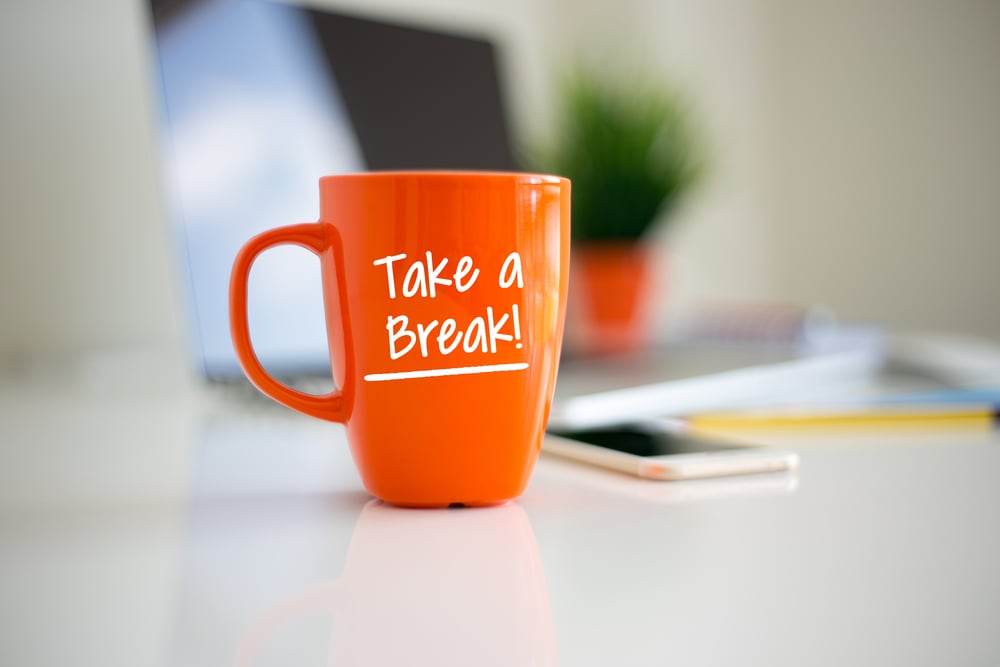
Marketing can be hazardous to your health, folks. Working in a high-stress corporate office environment is the ideal recipe for health issues.
Avoid marketing burnout by incorporating our 5 health tips - courtesy of nutritionist and marketing professional Nichole Mena!
Tip #1: Monitor Your Screen Time!
Eyestrain is a problem that many in marketing and sales face due to the amount of time spent in front of a computer. This is an occupational hazard - there’s simply no way around using a screen and keyboard in this industry.
The downsides to excessive screen time are numerous. According to a study from the University of California at Davis, too much time in front of a computer monitor can cause headaches, difficulty focusing, and increased sensitivity to light.
To prevent eye strain, there are some simple steps you can implement immediately:
- The distance to the screen from your eyes should be about an arm's length away. If you can comfortably read what's on your screen without having to strain or squint, then it’s an optimal distance. If you can't read your screen from an arm's length away, simply increase the font size on your computer.
- Reduce the light around you (ambient light) by half when in front of a computer screen. Brightness from harsh indoor lighting or outdoor sunlight coming in from windows can really fatigue eyes. Try using only one or the other when on a computer!
- Give your eyes some exercise and practice the 20-20-20 rule. Our eyes tire quickly from staring at a screen, and we often forget to blink for long periods of time. Build a habit of looking away from your computer about every 20 minutes shift your gaze to a distant object, at least 20 feet away, for at least 20 seconds. Looking far away at an object periodically helps to relax eye muscles inside the eyes and reduce fatigue.
Tip #2: Mind Your Posture
Unless you’re auditioning for a caveman reenactor position at your local museum, proper posture is a must for a healthy life. Another negative effect of working at a desk or on a computer for long periods of time puts damaging stress on your neck and back.
“If you’re sitting for a long period of time in one position that’s not a natural position or a bad position from a postural standpoint, over time, that’s going to cause you to have problems. It’s going to break down your spine,” says Dr. Marc Agulnick, an orthopedic surgeon based on Long Island, New York, and affiliated with NYU Winthrop Hospital.
In addition, a condition known as tension neck syndrome (TNS) can occur when the neck and upper shoulders are held in a fixed, awkward position for long periods of time, according to the National Institute of Environmental Health Sciences. People most prone to this condition spend time hunched over a keyboard for long periods of time or who talk on the phone for most of the day.
Make sure your neck isn't bent in one direction for long periods of time. When typing, make sure to take frequent breaks and rotate your neck to relieve stress. If your job demands long stretches of phone use, consider switching to speaker periodically, using a shoulder cradle, or wearing a headset with a microphone.
To prevent hunching in a chair, whether from typing or talking on the phone, several options are available. An obvious solution is taking frequent breaks to stand up, stretch, and walk around (we’ll talk more about breaks in a minute).
Another option is investing in an ergonomic office chair designed to promote proper posture. Since every single body is unique, it’s important to test several options, finding one that will encourage you to sit up straight and help prevent long-term damage to your back and shoulders.
Another growing trend in the workplace is to invest in a standing desk. Variable ones are best, allowing you to switch between sitting and standing positions periodically throughout the day. Full desk options are available, but an easier option is to purchase a standing desk converter, which can be placed on top of your existing desk.
Tip #3: Take Frequent Breaks
We always want to work through the day to get out of the office on time or early. But sitting for hours with no break can be hazardous, as mentioned previously.
Remembering to take regularly scheduled breaks throughout the workday can help prevent a host of health-related issues, such as eye strain from staring at the monitor, lower back and neck tension from sitting all day, and many other complications that come with our lethargic office lifestyle.
Not taking a break from work can cause mental exhaustion too! If your brain is tired, it will reduce your creativity. Make it a point to get away from your desk every now and again for a few minutes. The idea is to take a break, rejuvenate, and increase productivity.
One popular method for scheduling frequent breaks is via the Pomodoro Method. This strategy uses a timer to break down work into intervals - traditionally 25 minutes in length - separated by short breaks.
Each interval is known as a “Pomodoro,” from the Italian word for tomato. The inspiration came when the method’s creator, Francesco Cirillo used a tomato-shaped kitchen timer while attending university.
Millions of professionals rely on the Pomodoro technique for increased productivity and healthier habits while at work. And thanks to technology you won’t need a kitchen timer at the office! Free software is available on any operating system, including the Time Out app for MacOS, Pomodoro Timer for ChromeOS, and PomoDone for Windows.
Tip #4: Decorate Your Space (But Don't Clutter it)
While office health conversations often focus on improving physical well-being, mental health is just as important - and shouldn’t be neglected! Our environment can have a dramatic effect on our mental and emotional health. Sometimes the rigid, corporate feel of an office can make us feel depressed and anxious, like robots.
A simple solution is to decorate and personalize your workspace — within the rules of your company. Pick out three or four items of significance to you, such as a family photo or an award you're particularly proud of—and make sure those are placed somewhere within your normal view while at work. These simple placements can elicit positive emotions throughout your day, helping you place life’s important aspects into context during stressful moments.
Remember though - the more stuff you place on your desk, the more your brain can stress from the increased clutter. Why?
Your brain has more to scan and keep track of. Working in a crowded space can be mentally exhausting, even if you don't realize it. Think messy desk = messy brain.
It’s a matter of balance. Make space for items that remind you that work is just one aspect of your life!
Check Out Our Podcast for More Growth-Focused Discussions
This content is from a recent episode of Growth Marketing for Martians, a podcast dedicated to discussing tomorrow's business growth tips -today!
Hosted by Rogelio Rodriguez and Jeff Lambert, these marketing Martians share an intergalactic love for learning and sharing with other podcast space travelers.








.jpg?length=600&name=045%20-%20YouTube%20Cover%20Art%20(Video).jpg)


No Comments Yet
Let us know what you think